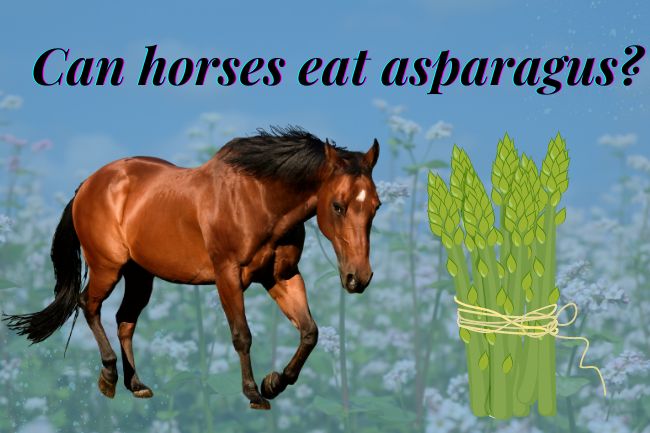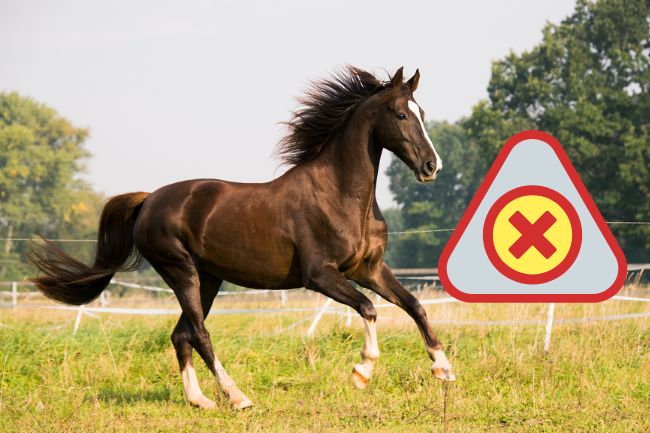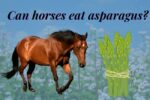Can horses eat asparagus? Asparagus is a popular vegetable known for its nutritional benefits, but can it be included in a horse’s diet? In this article, we will explore the topic and provide you with valuable insights into whether horses can safely consume asparagus, how to introduce it into their diet, and any considerations you should keep in mind. Discover the answers to your questions about horses and asparagus right here.

1. Can horses eat asparagus
Yes, horses can eat asparagus. Asparagus is a vegetable that is rich in fiber and vitamins, and it can be provided as part of a horse’s diet. However, as with any new food, it is important to ensure that asparagus is given to the horse in appropriate amounts and prepared properly. If you have any concerns or questions about feeding asparagus to your horse, it is recommended to consult with a veterinarian or equine nutritionist for specific advice regarding your horse’s situation.
2. How much asparagus should horses eat?
The amount of asparagus that horses should eat should be limited and provided in moderation. While asparagus can be included in a horse’s diet, it should not be the primary or significant portion of their feed. Asparagus should be considered as a treat or occasional addition to their regular diet.
A general guideline is to offer a small amount of asparagus, such as a few stalks, as an occasional treat. It is important to monitor the horse’s response to asparagus and ensure that they tolerate it well without any digestive upset or adverse reactions.
However, it is recommended to consult with a veterinarian or equine nutritionist for specific guidance on incorporating asparagus into your horse’s diet. They can consider your horse’s individual needs, overall diet, and any specific health conditions or dietary restrictions to provide the most appropriate recommendations.
3. Is it best to feed asparagus raw or cooked?
In addition to knowing “ can horses eat asparagus?”, it is important to consider how to feed them and what dosage is appropriate.
When it comes to feeding asparagus to horses, it is generally recommended to feed it cooked rather than raw. Cooking asparagus helps to break down its tough fibers and makes it easier for horses to digest. Raw asparagus can be difficult for horses to chew and may not be as palatable.
Cooking methods such as steaming, boiling, or lightly sautéing the asparagus can help soften it and improve its digestibility. It is important to avoid using excessive amounts of oil, salt, or seasonings when cooking for horses, as their digestive systems are sensitive to certain ingredients.
Before feeding cooked asparagus to your horse, ensure that it has cooled down to a safe temperature and cut it into small, manageable pieces. Additionally, always introduce new foods gradually into your horse’s diet to monitor their tolerance and response.
However, it is advisable to consult with a veterinarian or equine nutritionist for specific recommendations based on your horse’s individual needs, dietary requirements, and any specific health considerations.
4. Why is asparagus good for horses?
Asparagus can provide several benefits for horses due to its nutritional content. Here are some reasons why asparagus is considered good for horses:
- Fiber: Asparagus contains a significant amount of fiber, which helps improve the horse’s digestion. Fiber helps maintain a balanced gut microbiota, enhances nutrient absorption, and supports proper digestion.
- Vitamins and minerals: Asparagus is rich in vitamins and minerals, including vitamins A, C, E, K, and minerals such as potassium, iron, calcium, and manganese. These nutrients play vital roles in the horse’s development and overall health.
- Anti-inflammatory properties: Asparagus contains natural anti-inflammatory compounds, such as antioxidants and flavonoids. These compounds help reduce inflammation in the body and protect cells from harmful agents.
- Immune support: With its high vitamin C content, asparagus helps boost the horse’s immune system and enhances its ability to fight against diseases and infections.
However, as with any new food, it is important to monitor carefully to ensure there are no adverse reactions. Consulting with a veterinarian or equine nutritionist is essential if you have any concerns about feeding asparagus to your horse.

5. The harmful effects of asparagus on horses
While asparagus can be fed to horses, it is important to note that some horses may not accept or react well to asparagus. Here are some potential drawbacks of asparagus for horses:
- Diarrhea: Some horses may react to asparagus by experiencing diarrhea or digestive disturbances. This could be due to their digestive system not being accustomed to the fiber content in asparagus.
- Oxalate metabolism disorder: Asparagus contains oxalates, a substance that can form crystals in the urine and cause health issues. These crystals can cause body pain and impact the horse’s kidney function.
- Allergic reactions: Some horses may have allergic reactions to asparagus or its components. Symptoms of allergic reactions may include itching, skin inflammation, or difficulty breathing.
- Safety concerns: Asparagus can have tough and fibrous parts, which can pose a risk to the horse’s digestive system if eaten without being finely chopped or cooked.
Therefore, when feeding asparagus to horses, careful monitoring is necessary to ensure no harm occurs, and consultation with an equine nutritionist is important. If you have any concerns, it is recommended to seek advice from a veterinarian or equine nutrition expert for specific guidance in your particular case.
6. What should you do if your horse becomes unwell after eating asparagus?
If your horse becomes unwell after eating asparagus, it is important to take appropriate action. Here are some steps you can take:
- Monitor your horse: Observe your horse closely for any signs of discomfort, distress, or unusual behavior. Note any changes in appetite, digestion, or overall well-being.
- Remove the asparagus: If you suspect that the asparagus is causing the issue, remove it from your horse’s diet immediately. Discontinue feeding any more asparagus to prevent further complications.
- Consult a veterinarian: Contact a veterinarian who specializes in equine health to discuss your horse’s symptoms and seek professional advice. They can provide guidance based on the specific situation and conduct a thorough examination if necessary.
- Provide supportive care: Follow any recommendations or instructions provided by the veterinarian. This may include providing supportive care such as adjusting the horse’s diet, administering medication if prescribed, or implementing any necessary treatments.
- Keep your horse hydrated: Ensure your horse has access to clean and fresh water at all times to stay hydrated. Proper hydration is essential for overall health and recovery.
Remember, every horse is unique, and their reactions to asparagus or any other food can vary. It is crucial to seek veterinary advice to properly assess and address any health concerns.
7. Some good alternatives to asparagus for horses
- Carrots: Carrots are a popular and nutritious food for horses. They are rich in vitamins and fiber, beneficial for digestion and overall horse development.
- Cabbage: Cabbage is a common leafy vegetable that can provide fiber, vitamins, and minerals for horses. It can be fed raw or cooked.
- Beetroot: Beetroot is a food rich in fiber and contains a variety of vitamins, minerals, and antioxidants. Horses can eat beetroot raw or cooked.
- Brussels sprouts: Brussels sprouts are a good source of protein and fiber, beneficial for horse health. Horses can eat Brussels sprouts raw or cooked.
- Pumpkin: Pumpkin is a food that is rich in fiber and provides a good source of vitamin A for horses. Horses can eat pumpkin raw or cooked.
- Fresh green grass: Grass is a natural and essential food source for horses. Ensure that horses have sufficient access to fresh green grass to ensure adequate nutrition and fiber intake.
Note that each horse has unique nutritional needs and preferences. Check with a veterinarian or equine nutrition expert to ensure you are providing an appropriate diet for your horse.
In conclusion, horses can safely consume asparagus as part of their diet, provided it is introduced in moderation and prepared properly. Asparagus offers several nutritional benefits and can be a healthy addition to their menu. However, always consult with a veterinarian or equine nutritionist to ensure the best feeding practices and suitability for your horse’s specific needs. Remember to monitor their response and make adjustments as necessary. Enjoy exploring the diverse dietary options for your equine companion! We hope the article “Can horses eat asparagus? on Baolamdep.com provides you with valuable information.
